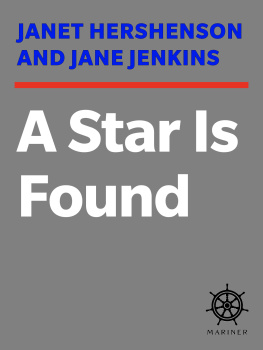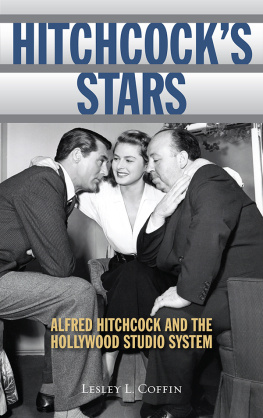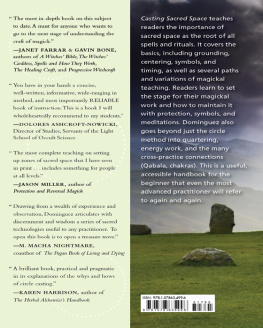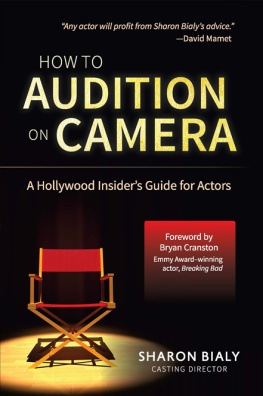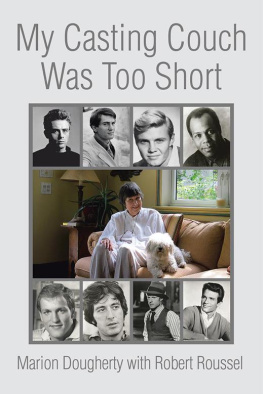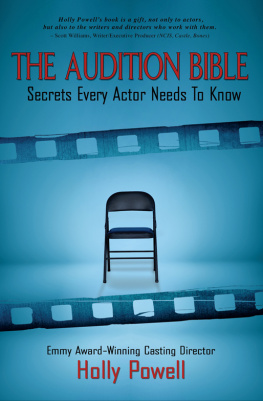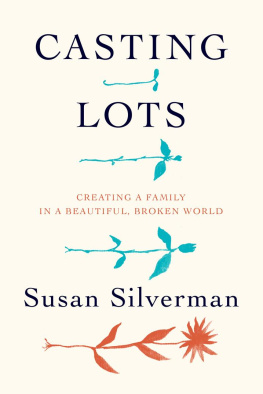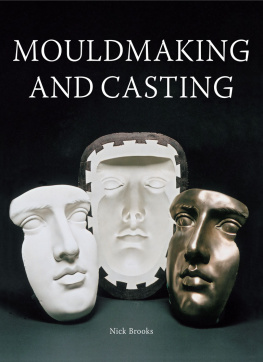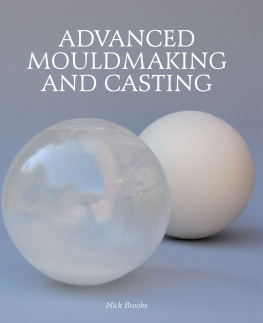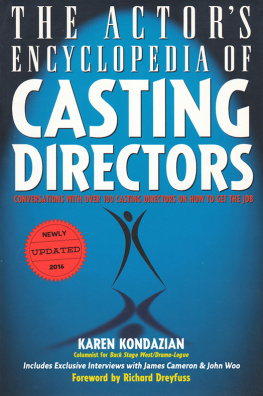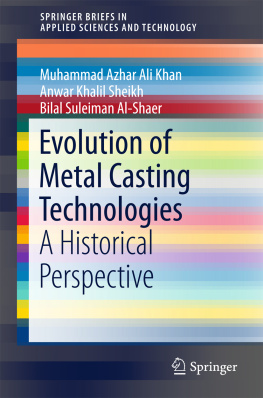Copyright 2006 by The Casting Company, Inc.
All rights reserved. No part of this book may be used or reproduced in any manner whatsoever without written permission except in the case of brief quotations embodied in critical articles and reviews. For information, address HarperCollins Publishers, 195 Broadway, New York, NY 10007.
marinerbooks.com
The Library of Congress has cataloged the print edition as follows:
Hirshenson, Janet.
A star is found: our adventures casting some of Hollywoods biggest movies/Janet Hirshenson and Jane Jenkins, with Rachel Kranz.1st ed.
p. cm.
1. Motion picturesCasting. I. Jenkins, Jane. II. Kranz, Rachel. III. Title.
PN1995.9.C34H57 2006
791.4302'8dc22 2006009242
ISBN -13: 978-0-15-101234-3 ISBN -10: 0-15-101234-2
e ISBN 978-0-547-54526-4
v3.0821
Wed like to dedicate this book to actors everywhere. Thank you for your talent and for the courage to share heart and soul, bringing words on a page to life. Without you we wouldnt be here.
Introduction
Casting is a part of filmmaking that most people never think aboutbut once you become aware of it, you might be startled at how central these decisions are to your experience of a film. Just recall Hollywoods casting legendsCasablanca, for example. The studios first choice for the role of Rick was George Raft, then a major leading man. Only when Raft wasnt available did the studio grudgingly accept minor contract player Humphrey Bogart, known mainly for playing gangsters in a slew of second-rate crime films. Matching Bogie with Rick turned the actor into an icon for world-weary, cynical heroes with hearts of goldand it endowed the film with near-mythic status. Who knows what would have happened if George Raft had been the one to murmur Heres lookin at you, kidbut its hard to imagine that a new type of film hero would have been the result. Bogart seemed so right that, once he was cast, the part seemed made for himeven though he hadnt actually been anyones first choice.
Or think of The Wizard of Oz with first choice Shirley Temple as Dorothy. When MGM couldnt get Americas sweetheart, they reluctantly awarded the role to Judy Garland, then known mainly for her teen musicals with Mickey Rooney. Of course, even without Judy, Oz would have been endowed with magic, a gripping story, and a stunning score, but Garland brought to the film her extraordinary combination of vulnerability, longing, sweetness, and hopequalities that made a potentially good movie into a great one.
Or consider The Godfather, early candidates for which were Ernest Borgnine and Ryan ONeal. Just take a moment to picture those two in the roles that Marlon Brando and Al Pacino ultimately played. At this point, the roles seem to have been written with Brando and Pacino in mindbut thats only because they did, finally, get cast in them; it was hardly a foregone conclusion. Likewise, Charles Grodin has long been notorious as the guy who turned down the part eventually played by Dustin Hoffman in The Graduate. Perhaps the movie would have been equally good with Grodin in the partbut at the very least, it would have been a different movie if Grodin, not Hoffman, had been the one to stammer, Mrs. Robinson, are you trying to seduce me?
The essence of a good casting decision is that you simply take it for granted. Only when you imagine a cast being different do you realize how great an impact a casting choice can have. To take a relatively recent example, think of the movie Good Will Hunting, which introduced Matt Damon and Ben Affleck to a broad audience. We didnt cast this movie, so were commenting on it purely as viewers. In that film, Matt plays the innocent math genius; Ben is his tough and knowing friendcasting choices that seem to work very well. Now imagine the two actors swapping rolesthink of Ben as the math whiz and Matt as the working-class guy whos left behind. Were not saying the movie wouldnt have worked that way, but it becomes a different picture. Imagining these roads not taken helps illuminate the kind of magic that can be generated when an actors persona, talent, and style mesh perfectly with his or her role.
The two of us have been casting directors through the last three decades of Hollywood history. We got our start in what we thought of even then as the University of Zoetrope, working with Francis Ford Coppola in his extraordinary effort to create another type of Hollywood studio. Francis is a true artist who dreamed not only of making his own groundbreaking movies but also of creating an environment in which other film artists could collaborate on a new kind of American cinema. Unfortunately, his Utopian venture only lasted a few years, but for those of us who were privileged to be a part of it, it was a life-changing experience.
When Zoetrope Studios went under, we went out on our own. We founded The Casting Company and began relationships with some of Hollywoods most exciting young directors: Ron Howard, Rob Reiner, Chris Columbus, and later on John Hughes and Wolfgang Petersenmen of artistry and integrity whom were still lucky enough to be working with today. Throughout the 1980s and 1990s, we also cast movies for such directors as Tim Burton, Brian De Palma, David Lynch, Steven Spielberg, Jerry Zucker, and many others. Then and at Zoetrope, we discovered such stars as Alec Baldwin, Steve Carell, Tom Cruise, John Cusack, Matt Damon, Benicio Del Toro, Leonardo DiCaprio, Anthony Edwards, Emilio Estevez, Brendan Fraser, Andy Garcia, Scarlett Johansson, Diane Lane, Rob Lowe, Michael Keaton, Kyle McLachlan, Virginia Madsen, Dylan McDermott, Joaquin Phoenix, River Phoenix, Tim Robbins, Julia Roberts, Meg Ryan, Winona Ryder, Nicollette Sheridan, Elisabeth Shue, Kiefer Sutherland, Patrick Swayze, Lili Taylor, Billy Bob Thornton, Bradley Whitford, Forrest Whitaker, and Robin Wright (later to become Robin Wright Penn). More recent directors weve worked with include Peter Berg (Friday Night Lights) and Nancy Meyers (Somethings Gotta Give, The Holiday), while among our twenty-first-century acting discoveries are Paul Bettany, Daniel Craig, Linda Hardy, Josh Lucas, Mike Vogel, and the Harry Potter kids: Daniel Radcliffe, Emma Watson, and Rupert Grint.
We gave some of those actors their first parts. There were others whose talent we recognized, and if we werent able to give them significant roles, we were at least able to help them pay the rent until something better came along. And then there were those who had maybe worked a bitbut we gave them the part that put them on the map.
You would think that with a list like that, wed both be unshakably confident whenever a new script crosses our desk. Alas, no. Like the veteran actress who never fully gets over her stage fright, neither of us has ever quite learned to greet a new movie with equanimity. The moment we take on a new project, the anxiety sets in. The typical Hollywood script contains roles for fifty to a hundred actors, not counting the extrasthose faces in the background who have no speaking parts. (Luckily for us, extras castingan entity unto itselfusually takes care of those roles.) The sheer volume of parts can be daunting, let alone the commitment we both feel to finding candidates who are truly right for each role, actors who will fulfill the directors vision and help the movie reach its best potential. We take our cue from Konstantin Stanislavski: There are no small parts, only small actors.
Casting is a complicated, delicate, and almost alchemical business. To be a good casting director, you need instinct, patience, and the ability to remember hundreds of diverse faces, voices, and performances. You also need the kind of empathy that enables you to know, almost before he or she does, what your director wants in a particular part, as well as the sympathy that allows you to put a nervous actor at ease or to help a potentially stellar actress find the great audition that you sense she can give. Perhaps most important, you need the kind of wild faith that enables you to keep believing in miraclesto know that the part thats gone unfilled for months will eventually be cast, to find the performer whos eluded you for so long, to see the talent in the awkward but brilliant kid whom no one else will consider. When that kind of faith is rewarded, its a thrill like nothing else weve ever known. Those are the moments we live for, the times that make all the anxiety worthwhileand the closest thing well ever know to magic.

